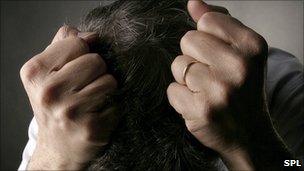Male depression 'set to increase'
- Published

Could the number of depressed men be about to rise?
Psychiatrists have warned that the number of men with depression could rise because of changes in Western society.
An article in the British Journal of Psychiatry, external suggests economic and social changes will erode traditional sources of male self-esteem.
The authors say men will struggle with the shift away from traditional male and female roles.
The Men's Health Forum said male identity was bound up in employment.
One of the authors, Dr Boadie Dunlop from Emory University School of Medicine, said: "Women are almost twice as likely to develop major depressive disorder in their lifetime as men, but we believe this difference may well change in the coming decades."
He argues that traditional males jobs such as manufacturing or physical labour are being lost, either through improved technology or jobs moving to other countries.
On the other hand the article states that as women are now more likely to go to university than men so the number of households where the main breadwinner is female will increase.
Male identity
"Men's failure to fulfil the role of breadwinner is associated with greater depression and marital conflict," the article states.
Dr Dunlop said: "Western men will face a difficult road in the 21st century, particularly those with low levels of education. We believe economic and societal changes will have significant implications for men's mental health."
Peter Baker, chief executive of the Men's Health Forum, said: "This really confirms what we already know about unemployment and that it has a much bigger impact on men, mainly because male identity is bound up as a worker.
"Male social networks are based around work so losing a job can lead to isolation and depression."
Dr Cosmo Hallstrom, a consultant psychiatrist, said: "If you've spent 20 years pouring steel and the mill closes you can't just go and do something else.
"It seems self evident in a recession with joblessness that it will be bad for physical and mental health and some people will get depression.
"Having to send your wife out and feel like a parasite surely would put up the rate of depression, but overall is it unique to men? I don't know."
Mr Baker said men do not seek help when they have depression and were "more likely to self medicate in the pub" than seek professional care.
He said: "As we see more men affected we need to think about how to support and get them back to work."